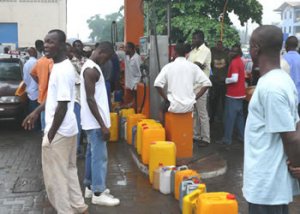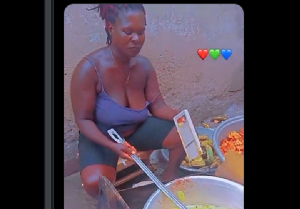A big Nigerian bank is shortening its opening times in the latest sign of the impact of the fuel shortage.
Guarantee Trust Bank says its branches will close at 12:00 GMT as it struggles to get fuel for its generators.
The party of President-elect Muhammadu Buhari has accused the outgoing government of "sabotage" as it is failing to deal with the crisis.
The wholesale fuel sellers have been withholding petrol as they say they are owed $1bn (£625m) by the government.
The shortage, which has been going on for more than a month, means that Africa's biggest economy is slowly grinding to halt, says the BBC's Will Ross in Lagos.
Most Nigerian businesses and homes rely on diesel-powered generators because of the poor electricity infrastructure.
Over the weekend, two of country's leading mobile phone companies, MTN and Airtel, warned that the fuel scarcity could effect their services as they were finding it difficult to supply diesel to the base stations.
Traffic on the roads is also reducing as many fuel stations have stopped selling petrol and there are long queues at places where they are selling petrol, our correspondent says.
Many domestic flights have been cancelled and some international flights are having to land in neighbouring countries to refuel.
It appears the fuel importers and marketers who operate a multi-billion dollar scam are blackmailing the government into agreeing to one more massive payout as they are not sure how much longer the fuel subsidy racket will go on.
They are literally shutting down the nation saying they are owed $1bn in arrears, but no-one gets to see how that figure is worked out. Many government officials, including employees of the state fuel company, are so intertwined in the fraud it is hard to know who is scamming who.
One thing is clear. Nigerians across the country trying earn a living to feed their families are facing a new level of hardship.
The incoming president is inheriting one hell of a mess.
At the heart of the shortage is a row over the payment to wholesalers of the difference between the subsidised pump price and the international market price.
The wholesalers are waiting for a $1bn payout from the government before they release more fuel.
It is thought that President-elect Buhari, who takes power on Friday, may move to end the petrol subsidy and so the wholesalers are trying to get something from the outgoing administration.
The opposition All Progressives Congress (APC) thinks government inaction is deliberate so that Mr Buhari will take over a "nation in deep crisis".
On Sunday, APC spokesman Alhaji Lai Mohammed said in a statement that the "departing office holder [was] defecating on the chair he is vacating".
The People's Democratic Party of outgoing President Goodluck Jonathan says that it is the opposition which is behind the crisis "to create an impression that the APC is inheriting... a complete system breakdown".
The fuel subsidy has become an enormous scam, our correspondent says.
The wholesalers often pretend to bring in a lot more oil than they do and pocket the money they get for the petrol that is not delivered.
Business News of Monday, 25 May 2015
Source: BBC













